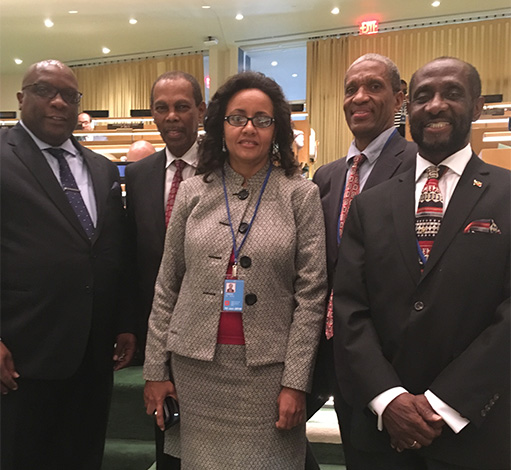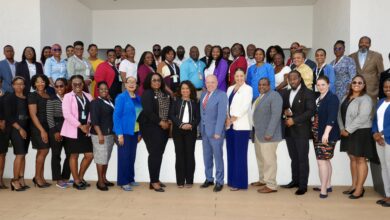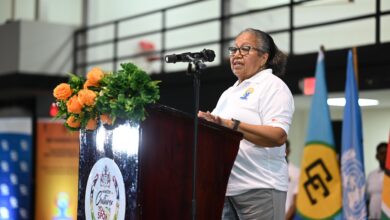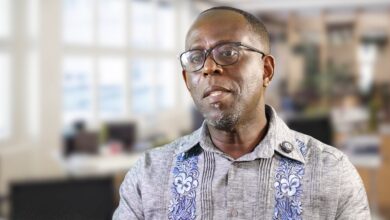PANCAP shined at a Breakfast Caucus held on 8 June 2016 to brief Caribbean delegates and to cement a consolidated regional position for the plenary sessions and side meetings of the United Nations High Level Meeting which ends on 10 June.
Caribbean delegates from Government and Civil Society as well as development partners lauded PANCAP’s achievements and inclusiveness as a best practice and regional coordination model for the world; noting that the model could be adapted to address the challenges of other public health threats.
Development partners at the meeting, committed to advocate for continued external donor funding and to provide strong programmatic support to assist PANCAP in addressing the needs of key populations and to fill gaps in the response.
The PANCAP Director and Civil Society partner, the Caribbean Vulnerable Communities Coalition (CVC), highlighted the urgency of the challenges the region currently faces in relation to reduced external funding; stigma and discrimination that hinder key populations’ access to prevention, treatment and care services; and the continued existence of structural barriers such as policies and legislation.
In responding to the challenges highlighted, Dr. the Hon. Timothy Sylvester Harris, Prime Minister of St Kitts and Nevis and CARICOM’s Lead Head with responsibility for Human Resource Development, Health and HIV and AIDS emphasized the need for the region to come together to deal with these issues which he said was “the core of our development challenge”.
#StKitts PM Timothy Harris noted the vulnerability of MSM, women & girls in the #Caribbean #HLM2016AIDS @CARICOMorg pic.twitter.com/tueFuhDg8c
— UNAIDS Caribbean (@UNAIDSCaribbean) June 8, 2016
The Prime Minister who reminded the meeting that the health of the Caribbean region represented its wealth, thanked the civil society organisations for their leadership in reaching persons who would not have otherwise been reached. He called for critical action and for “more of our leaders to become the voice for reason and compassion in our society”, as well as for a new legislative agenda.
Prime Minister Harris committed to briefing regional leaders on the challenges and critical actions required for ending AIDS by 2030, at the upcoming Conference of Heads of Government scheduled for early July, in Guyana.
Dr Carolyn Gomes, Executive Director of CVC, in her address conveyed a sense of the urgency of NOW in the Caribbean as it related to HIV and AIDS.
“We have made great strides in eliminating mother to child transmission of HIV, but we have not removed a single discriminatory legislative or policy barrier that prevents vulnerable populations of men who have sex with men, of sex workers, of transgender persons, of migrants, of prisoners, or of marginalized youth from getting access to services”, she said.
“We must act NOW to ensure that the legal and policy barriers that maintain the untenable discrimination against vulnerable groups in the Caribbean and prevent their accessing services to which they are entitled, are removed and replaced by anti-discrimination legislation that protects the equality that we all are entitled to, as human beings, as citizens of our beloved Caribbean”, she added.
Dr Gomes urged Civil Society and States to work together to ensure the gains made in the Region’s fight are not derailed, and called for the leadership that the Caribbean was capable of.
Mr. Dereck Springer, Director of the PANCAP Coordinating Unit, highlighted PANCAP’s achievements and outlined the priority strategies that must be funded and implemented to eliminate AIDS by 2030 in the world and specifically in the Caribbean.
These he identified as: addressing structural barriers (policy and legislation) that impede vulnerable people’s access to services through the Justice for All programme; integration of HIV into health and socio economic development; reaching, testing and retaining persons living with HIV in treatment and care to achieve the end of AIDS; financial and institutional sustainability at national level through HIV investment and country ownership; pooled procurement and price negotiations for medicines and laboratory reagents; and addressing the underlying causes of vulnerability and risk: poverty, inequality and social exclusion.
Mr. Springer defined PANCAP’s future roles as helping Member States to ensure that the funds from the Global Fund continue to protect and sustain the gains, and that action takes place to achieve the strategic priorities. He called on all partners to take collective action in advocating for global and national HIV investment to fill the remaining gaps.
The Breakfast Caucus was co-chaired by St. Kitts and Nevis Minister of State with responsibility for Health, Hon. Wendy C. Phipps, and CARICOM Secretariat Assistant Secretary-General for Human and Social Development.
In addition to the St. Kitts and Nevis Prime Minister, the caucus was attended by 62 delegates including the First Lady of Haiti, nine Ministers of Health, permanent secretaries, national technical partners, civil society and development partners, Member States permanent representatives to the United Nations, the UN Special Envoy for HIV in the Caribbean and the media.
PANCAP is a Caribbean regional partnership of governments, regional civil society organisations, regional institutions and organisations, bilateral and multilateral agencies and contributing donor partners which was established on 14 February 2001. PANCAP provides a structured and unified approach to the Caribbean’s response to the HIV epidemic, coordinates the response through the Caribbean Regional Strategic Framework on HIV and AIDS to maximise efficient use of resources and increase impact, mobilises resources and build capacity of partners.






